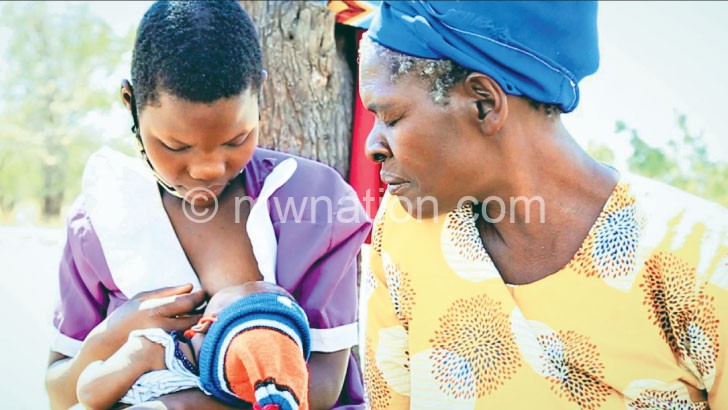Securing adolescents’ future
Children at Masidi Primary School in Liwonde, Machinga are accustomed to seeing a fellow learner breastfeeding a three-month-old baby on campus during break.
“My grandmother brings the baby from Monday to Friday. Teachers and fellow learners do not scorn me, but support me to learn without feeling ashamed,” says Esitere Sitaubi of Maluma Village.
The Standard Five learner, who dreams to become a doctor, re-enrolled with the support of a mother group trained by Centre for Human Rights and Rehabilitation (CHRR).

Her grandmother Daina Black, 60, remembers that after Estere gave birth, the concerned mothers frequently visited her to help the girl return to school.
“It is unwise to keep teen mothers at home or in wedlock. I accepted the challenge because I appreciate the importance of education,” she says.
Namandanje Mother Group chairperson Elina Wahiya says the women work closely with teachers and other stakeholders to keep girls in school.
“Teen pregnancies and child marriages in Malawi are rampant due to poverty, parental indifference and cultural beliefs that tolerate violence against girls and treat them as lesser beings than boys. The worst hit are poor girl, especially rural dwellers,” she explains.’
Since 2016, CHRR is working in partnership with Plan Malawi, Family Planning Association of Malawi, Amref for Africa and Cyece to reduce child marriages and teen pregnancies in Liwonde.
The ‘Yes I Do’ programme funded by Rutgers seeks to increase adolescent’s access to sexual and reproductive health (SRH) services and information.
Says CHRR acting executive director Michael Kaiyatsa: “Adolescent girls and boys in Malawi do not enjoy their SRH rights to achieve their full potential.
“We want to empower them, especially girls, to view themselves as rights holders with choices and opportunities. They have the power to end the misconception that marrying off girls is a way to end poverty.”
Community leaders in Liwonde have passed bylaws to end sexual practices fuelling school drop-out rates, teen pregnancies, child marriages and sexually transmitted infections, including HIV.
Group village head Mangamba most people in the area are keeping hands off girls because they fear to pay fines, which range from chickens to goats.
“Child marriage is associated with lower education and economic status of girls, who are forced to quit school, increasing poverty and health burdens such as fistula and pregnancy-related deaths,” he says.
Machinga district gender development officer Rita Sukasuka says the bylaws are evening up gender inequalities and social pressure that perpetuate child marriages and teenage pregnancies.
“Gender inequality puts girls in a subordinate position towards boys or men in [sexual] relationships. As such, girls lack power to negotiate for safe sex, resulting in widespread teenage pregnancies,” she says.
According to the 2015 Malawi Demographic and Health Survey, almost half of Malawian women marry before their 18th birthday, the country’s legal marriageable age.
The finding shows a third of adolescent girls were found pregnant during the nationwide survey.
“Machinga is among the top five districts with the highest number of child marriages and teenage pregnancies. The project is helped increase girls’ enrollment and retention in school,” says Yes I Do project coordinator Thandizo Mphwiyo.
CHRR, through the project consortium, was among the campaigners for the review of the marriageable age review from 16 to 18. Despite the law amendment, child marriages and teenage pregnancies remain the most tolerated but harmful violations of girls’ rights in the country.
“Although Covid-19 pandemic has eroded some of the gains from the project adolescent, girls can now decide if, when and whom to marry or to have children,” says Mphwiyo.





